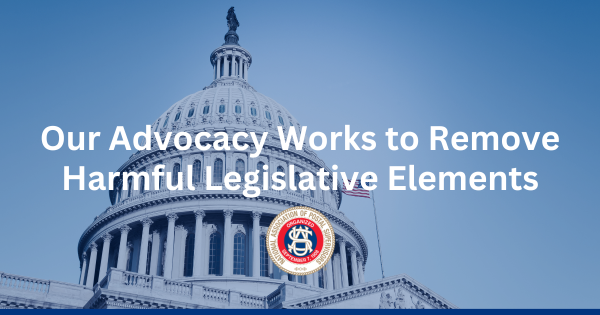Our Advocacy Works to Remove Harmful Legislative Elements
Our Advocacy Works to Remove Harmful Legislative Elements
By Bob Levi
NAPS Director of Legislative & Political Affairs
Beside my desk at NAPS Headquarters is a 20-gallon aquarium. My constant companions are a dozen tropical fish—a few named after current political personalities—whose survival depends on the efficacy of a water filter.
The filter is intended to remove toxins and contaminants from the aquatic habitat by running the water through a variety of different substances. Each successive substance removes different hazardous materials until, finally, the water can sustain my fish and keep them healthy.
At times, the legislative process functions as a filter to render public policy functional. However, at other times, the process can compound hazardous policies into a dangerous, legislative potion. Your job in promoting your own interests and the interests of your family and colleagues in the legislative process is to remove venom from big, ugly bills and ensure the process does not add poisonous elements.
Through the online and much-publicized NAPS Legislative Advocacy Portal, we have enhanced our ability to influence the legislative process. Thousands of NAPS members and their family members have activated our novel and effective legislative filtration device.
Together with our colleagues in the federal-postal community, NAPS persuaded members of the House to prune the big and ugly budget reconciliation bill. On May 22, the House of Representatives passed H.R. 1 by a single vote (215-214).
It is important to recognize how the legislative filtration process has worked the first six months of 2025. In February, the House Ways and Means Committee’s Republican majority submitted a long list of potential federal and postal benefit cuts to the House Budget Committee to partially offset the costs associated with its enormous tax reduction proposal. In mid-February, the Budget Committee drafted a budget “framework” that tasked the House Committee on Oversight and Accountability with proposing provisions to cut over $50 billion from postal and federal benefits.
NAPS activated its Advocacy Portal to alert members of Congress of NAPS’ opposition to the cuts. In late April, the Oversight and Accountability Committee approved provisions included in the emerging reconciliation bill that, in part, would increase the Federal Employees Retirement System (FERS) contribution for employees hired before 2014, reduce annuities and eliminate the FERS annuity supplement for future retirees, require federal workers to choose being an “at-will” hire or pay an addition 5% toward FERS and impose a user-fee on employees seeking due process through the Merit Systems Protection Board (MSPB).
Before being voted on by the House, NAPS once again activated its Advocacy Portal, enabling NAPS members to voice displeasure with H.R. 1. In mid-May, hearing the outcry, the powerful House Rules Committee amended the bill by eliminating the provision to increase FERS contributions, pushed off annuity changes until 2028, but left the “at-will” hire provision unchanged.
Finally, on May 22, further responding to the outrage, H.R. 1 was delivered to the House floor and passed without provisions to increase retirement contributions or change the annuity formula. As of early June, H.R. 1 was in the hands of the Senate. Our job is not over; there remain several provisions in the bill harmful to postal supervisors, managers and postmasters.
First, the House-passed bill would eliminate the FERS supplemental annuity on Jan. 1, 2028, for those not yet receiving the FERS supplement. The supplement provides a financial safety net for FERS annuitants who retire before reaching age 62. The Congressional Budget Office estimates the elimination of the FERS supplement would save about $6.9 billion over the next decade.
Second, H.R. 1 would require newly hired or promoted federal employees to choose between being employed “at will” or paying an additional 5% of salary for FERS coverage. Most importantly, newly hired or promoted EAS-level postal employees would be covered under the House-passed provision, even though the inclusion of postal supervisors, managers and postmasters would increase the federal deficit.
In essence, this provision extorts those impacted into paying 5% of salary to maintain merit-based, civil service protections. An “at-will” employee can be fired for any reason or no reason, without much recourse or due process. This provision advances the White House goal to eradicate existing civil service protections and federal unions.
NAPS already is working with Senate allies to remove this unfair attack on EAS-level USPS employees. Ironically, the CBO projects the provision, as it would impact the USPS, would increase the federal deficit by $111 million. However, the provision, as it would impact non-postal employees, would increase federal revenue by
$4.2 billion.
Third, H.R. 1 would impose a user-fee on postal and federal employees who seek to use the MSPB to exercise their due-process rights. The fee would be refunded to the employee should the employee prevail.
One of the dominant issues related to the big, ugly bill is its cost. In early June, the nonpartisan CBO projected the bill would increase the federal budget deficit by a staggering
$2.4 trillion. This type of budget-busting bill amps up the probability of the White House and Congress turning to the postal and federal community to bankroll the bill.
This would mean resurrecting benefit cuts the House already purged from the bill in May. It also could potentially add new cuts to help underwrite corporate and high-income tax relief, as well as provide funds for other White House priorities.
What is clear is that NAPS members must continue to employ legislative filters to purify bills as they work their way through the House and Senate. In this way, you will be able to protect your benefits and your job security.
